Susan Penhaligon has enjoyed a long, successful and fulfilling career as an actress. Always a maverick with a restless creative bent, her choices reflect an urgency to explore new territory and to challenge herself
Although she is primarily known as an actress of stage, screen and television, I was fascinated but not surprised to discover that she has also taken pen in hand and written a novel, co-written one volume of poetry and served as the editor and driving force behind another volume of poetry for charity. Indeed, the hallmark of Ms. Penhaligon’s career is her ability to choose projects and people that reflect her originality through insightful collaboration. There is also a thread of social activism running through the fabric of her artistic pursuits that benefits those to whom she has generously donated her time and interest. Celebrities and actors are often seen through the narrow focus of tabloid fodder that is one dimensional and often negative, a distortion that unfortunately leaves the public unaware of the valuable work many famous people do on behalf of those in need. Ms Penhaligon and I discussed this as well as her feelings about writing and the creative life that she has led thus far.
TM: When I was preparing for this interview, the one recurring frame of reference from which all your creative endeavours have had their birthplace is your obvious motivation to try new things. At first glance it would appear that the movies, television, theatre and writing projects you’ve chosen had not one thing in common but in fact, they are often linked to literature in one way or another. Were these deliberate decisions on your part as an artist to choose projects that nurtured your love of words and storytelling or was this merely coincidental?
SP: I have always loved words. At school we had a poetry speaking class and I discovered I had a gift for it. My father had encouraged me from an early age to write poetry. He use to say a poem is like snapshot of a moment in your life, an emotional diary. I was 7 when he said this. I suppose I never lost the freedom of a child. I inherited it from him
TM: Throughout your career you have had many transitional phases handling each with grace and a passion for the creative process. You’ve been a sex symbol, film, television and theatre actress as well as a poet, editor and novelist. Where are you happiest as an artist, on stage, screen or breathing life into words on the page? Some people may be surprised to learn that you write fiction. Your novel For the love of Angel again cements the notion that you are a bit of a renegade creatively.The novel delves into history and is set in Cornwall, a part of the country that is dear to your heart. I found this a gut wrenching read in places and the aching prose very effective for depicting the events and subsequent inner turmoil of those involved. It is very difficult to bring to life another era but you are clearly aware as a writer that the ingredient necessary for bringing the reader into another time and place lies within the character development rather than the setting. Do you feel your experience as an actress has given you a unique insight for writing fiction thus making it easier for you to breathe life into your characters and do you think writing is really just a sort of silent solitary acting?
SP: I’m happy acting. It’s my natural home now. It’s part of my personality and the rhythm of who I am. But sometimes I wonder if my father and mother had not broken up and he had not left for America, if he might have encouraged me to try writing rather than acting. The two creative processes seem to come from the same place inside. At the end of a day writing my book I felt exactly the same as I did after a day rehearsing a play. It’s the imagining of a character. Feeling what they are feeling.

TM: In 1996 you joined forces with actress Sara Kestelman to produce a volume of poetry entitled A Two Hander that can only be described as one hell of a poetry venting session between two girlfriends. For me as a poet, the back and forth dynamic of this book was a fascinating concept and revelatory in the most surprising ways. It was almost like watching the story of your lives unfold with each page turned; fearless, painful at times but often irreverent and witty. It would be intriguing to see what another poetic discourse with Sara would reveal about where you have both been since the initial poetic chat and what you have learned about life in the intervening years. Where did the idea for the book originate and if the opportunity afforded itself would you be open to doing a second A Two Hander?
SP: Sara is one of my best friends. We became friends after we discovered we both wrote poetry as a way of describing our lives, our loves and losses. We’d send poems to each other like letters. One day I said to her, I think we’ve got a book. It was tricky choosing what to put in what to leave out. We tried to match the poems. The real experience for both of us as actors was when we performed them at the Hampstead Theatre. One of the highlights of my performing life. But very scary because my poems are so personal. But someone said to me, they’re personal/universal. That’s what poetry should be. Sarah and I are still friends but we’ve moved on. Somehow that moment when we both needed to connect with our poetry has gone.

TM: A great many of your poems are confessional and told from a narrative point of view that is undeniably honest and close to the bone. This surprised me because I fully expected a third person mask with the words used as substitute for a stage. Instead what I experienced was the removal of that mask and all the emotional limitations associated with it. One poem in particular from A Two Hander that emphasizes this lack of artifice in favour of naked self examination is To Alcohol. It’s a concise description of vice, blatantly clear and triumphant. When I read the poem Unavailable I saw an astute observer of the frailty in others as well as in herself and an unabashed need to say it as it is. Based on the emotional content of your writing, do you find that the act of creating a poem is cathartic in some way for you?
SP: Yes cathartic. Yes maybe. But it’s like a wave that rolls over you and takes you with it. You don’t have any choice but to write the poem. Actually I thought everyone could do it (as I grew up) It’s only recently I’ve realised what I’ve got. I can actually sit down and write a poem at any time. It might not be a good one. They’re given to you. From the Gods. The Muse. Whatever you wish to call it. But I could write something. And it could even rhyme!
TM: In 1996 For the Children a book of poetry and song written by celebrities for the charity NCH Action for Children was published. You wore an editor’s hat for this venture in addition to contributing a poem to the volume. Obviously this was a very public display of fame being used to benefit children in need but there is also a great deal of behind the scenes work being done by celebrities that the public isn’t always privy to. For anyone with a measure of success and fame this must be a tightrope to walk; determining which charity to back publicly and which to silently assist. What is it that makes you a vocal advocate for a charity and are there any that are currently close to your heart that you want to mention?
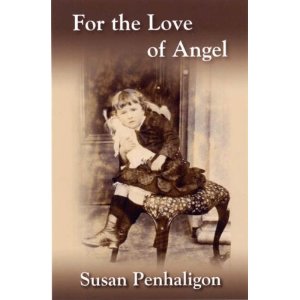
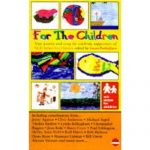
SP: It was my idea to produce a poetry book for charity (NCH) I chose the poems the lay out everything. The hope was it would sell and raise money. But it didn’t do that well. I wanted to involved with a children’s charity because I had a young son. Children’s issues affected me deeply. As I’ve got older and my son has grown I’ve got a little more political in my charity supporting. I’m patron of a local rape crisis centre and a charity that helps families integrate into the local community. I also send money for the Orang-utans in Borneo. The orphaned baby ones got to me!
TM: As I mentioned earlier, your writing is often confessional in nature and indeed, you have led a fascinating and full life during an era of immense social change for women. Do you think you will pen a memoir at some point or is this something you find too intrusive and best addressed creatively through your poetry?
SP: Interesting question about the memoir. I’ve been trying to write a fictionalised version of my relationship with my father but I’m stumbling and not sure where I’m going with it. I suppose the answer is no, not an autobiography. Poems are better. I need to write some more!
*To Alcohol and Unavailable copyright 1996 Susan Penhaligon from A Two Hander
To Alcohol
A sullen mute lived
courteously between us
fearing the chop,
at anytime
And come summer
when the mock orange tree
bloomed
I called his bluff,
and left
Unavailable
You, your cover-ups and protected heart
your masked face with spy hole centred small,
through which to glimpse the secret carried
in your knowing look.
I tiptoed close and pressed my eye
against the gap you rose to let me in
but only saw disdain and worming hate
for those who dared to peep
Val B. Russell is the creator and managing editor of Tuck Magazine as well as a Pushcart nominated poet and novelist.

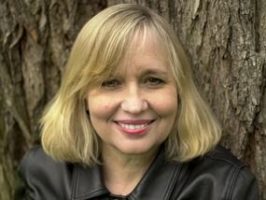
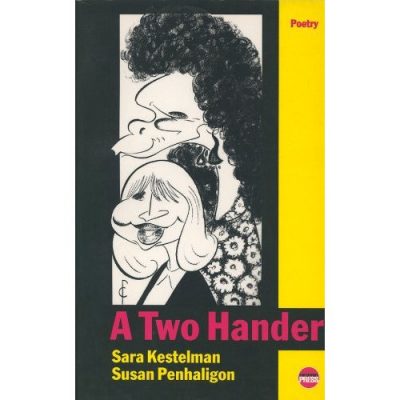
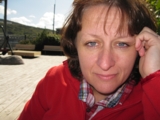
No Comments Yet!
You can be first to comment this post!